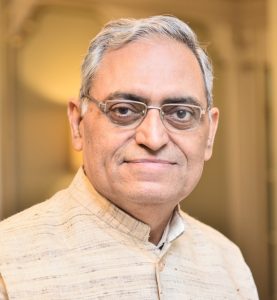1. With over 40 years of experience in the legal arena, specifically, 25 years devoted to the Ministry of Law and Justice being the Union Law Secretary, according to you how has the dynamics of the legal environment in India changed? If it has, has the change worked for the better or for the worse?
Answer- The framers of the Constitution were wise enough to define the parameters within which all three organs of Government viz. The legislature, Executive and Judiciary will function. Fortunately, we have a vibrant judiciary. In spite of certain shortcomings like shortage of judges, large pendency, and lack of infrastructure, as and when the situation demand, our judiciary has risen to the occasion to uphold the constitutional principles and to protect the interests and rights of the socially and economically weaker sections of the society. Law being an instrument of social change has worked for the betterment of the society and, therefore, I believe that the dynamics of the legal environment in the country keeps on changing depending upon the requirement of the society.
2. Starting with humble beginnings, in the Delhi University being a gold medallist to holding highly esteemed positions such as from being a Member of the Law Commission to being the Presiding Officer of the Securities Appellate Tribunal, to Chairmen of Adjudicating Authority of Prevention of Money Laundering; how has the evolution taken place? Do these positions hold value to you, or do the results they bring about seem more eminent to you?
I always felt that holding important positions in the government is an opportunity to do value additions, in my own humble way, for the welfare of the society. Laws are for uniform application and for the betterment of the society and need to be interpreted that way. Every such opportunity coming my way was taken as a challenge. Working in the tribunals gave an opportunity to get input from some of the best legal brains in the country. Working in the Ministry was an opportunity to work with the top policymakers including Parliamentarians and give suggestions for improvement in the legal system. Companies Act, 2013, Commercial Courts Act, 2015, Arbitration & Conciliation (Amendment) Act, 2015, GST Act,2016 and IBC, 2016 are some such legislation which will help in improving economic environment in the country.
3. Moving on to the various Acts and Constitutional Amendments which you have been part of such as Criminal Law Amendment (2013), Companies Act (2013), Representation of People’s (Amendment) Bill, Consumer Protection(Amendment) Act, Arbitration and Conciliation (Amendment) Act (2015) Insolvency and Bankruptcy Code 2016; how has your expertise proved to shape these Acts? Have the amendments proved to be useful in the efficiency of carrying out the Act?
The drafting of laws is not an easy task. One has to take into consideration the constitutional provisions, the policy of the Government, requirements of the society and effectiveness of the law. This is a teamwork and needs input from all concerned sections of the society. Exposure to the interactional forums like the United Nations, WTO, UNCITRAL; negotiating bilateral agreements with other nations; experience of working in various tribunals and input through various court decisions helped in widening the thought process for drafting and interpreting laws for their proper implementation.
4. Coming from the background of having a Diploma LLM on International Law to going on to be the Head of Indian Delegation in a meeting with UNCITRAL(The United Nations Commission on International Trade Law) to representing India in the WTO(World Trade Organization) in Dispute Resolution Panel, has India made a significant mark in the global world? While international arbitration has increased manifold, this has shifted the focus from international jurisdiction, has this also been the case in India? Has dispute resolution been able to infiltrate into the traditional legal system of India? If so, to what extent?
Yes. There is definitely a change in the thought process of the judiciary for betterment of the Society and to achieve the constitutional goals. With a view to expedite judice delivery, now Judges of the higher judiciary normally do not entertain appeals if the lower court has taken a plausible view, more particularly in commercial disputes. Obligations under international treaties, if not in conflict with domestic law, are enforced by the courts. India is known for having one of the best legal brains in the world. We have Indians in the International Court of Justice, International Court for the Law of the Sea and many other international organisations. Even in International Commercial Arbitrations, Indian Judges and Advocates are always in demand. Recent Amendment in the Arbitration and Conciliation Act, 1996 has also taken care of international developments and is an attempt to provide a congenial environment for making India a hub for international arbitrations. Some of our former judges have been appointed as judges in the Apex court of foreign jurisdictions which shows respect our judiciary command in the world community.

